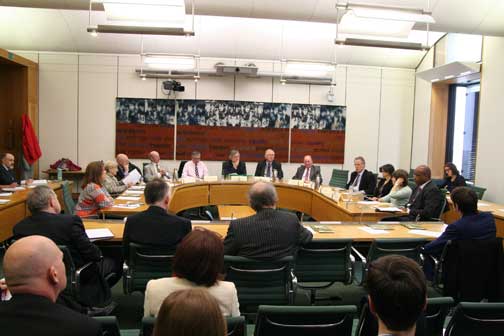 The Westminster roundtable heard yesterday that think tank ‘research’ paid for by housebuilders or their trade bodies routinely avoided all reference to problems in the retirement housing sector.
The Westminster roundtable heard yesterday that think tank ‘research’ paid for by housebuilders or their trade bodies routinely avoided all reference to problems in the retirement housing sector.
The event was organised by Campaign against retirement leasehold exploitation / LKP, and hosted by the charity’s MP patrons Jim Fitzpatrick and Sir Peter Bottomley, and was attended by 50 leasehold sector stakeholders.
Melissa Briggs, co-founder of Campaign against retirement leasehold exploitation and a trustee of the organisation, also attended, where her extraordinary contribution to the campaign was recognised.
In a resume of past and present issues in the sector, Sebastian O’Kelly, trustee of LKP / Campaign against retirement leasehold exploitation, said that “once or even twice a year a think tank report pops up talking about the virtues of retirement housing and reporting high satisfaction in the sector.”
“Broadly the message is: retirement housing is good in combatting loneliness, easing the burden on health and social services as patients are gathered together, freeing the wider housing market by getting movement at the top, using empty bedrooms for young families etc.
“What they routinely ignore is that the retirement housing sector has an abysmal reputation for exploitative practices that are well attested in two Office of Fair Trading reports, numerous court cases and parliamentary debates.
“Retirement housing is good and for many elderly, particularly the bereaved, it is a wonderful thing to live communally. But you can love your home, like the neighbours and location – and still be extremely dissatisfied with the management and freehold set-up.”
Mr O’Kelly urged MPs present:
“If a housebuilder in your constituency is building flats with 125 year leases and, say, £450 a year ground rents, ask why.
“125 year leases won’t catch the first buyer, or the second buyer, but almost certainly will the third or fourth.
“If the lease gets below 82 years it will evaporate in value. And owners in their mid-80s do not extend leases as those monetising in this sector know full well.”
Mr O’Kelly made reference to the two OFT reports into the retirement housing sector – one on exit fees, the other the sham tendering scandal orchestrated by Peverel / Cirrus – predicted a third scandal involving the transference of ownership of house managers’ flats in 2009.
This practice initiated by the Tchenguiz group, which then owned Peverel, was imitated by a few housing associations, although the latter appear to have ceased doing so.
The achievements of LKP / Campaign against retirement leasehold exploitation were listed – the saving of over £1 million for leaseholders – as well as at last seeing legislative change.
The full text of the speech is below.
I am going to give a quick overview of retirement leasehold housing, what we want, what we have achieved and what we are still after.
Our problem, broadly, concerns retirement leasehold tenure and the exploitative practices surrounding it.
We are virtually alone in expressing concerns about this although our analysis of this sector and AgeUK’s are virtually identical. But leasehold is a very small part of that organisation’s activities.
It dismays us that once or even twice a year a think tank report pops ups talking about the virtues of retirement housing and reporting high satisfaction in the sector (the latest comes from the building warranty company, the NHBC).
Broadly: retirement housing is good in combatting loneliness, easing the burden on health and social services as patients are gathered together, freeing the wider housing market by getting movement at the top, using empty bedrooms for young families etc.
What they routinely ignore – but then they are often paid for by housebuilder organisations – are that the retirement housing sector has an abysmal reputation for exploitative practices that are well attested in two Office of Fair Trading reports, numerous court cases and parliamentary debates.
Retirement housing is good and for many elderly, particularly the bereaved, it is a wonderful thing to live communally. But you can love your home, like the neighbours and location – and still be extremely dissatisfied with the management and freehold set-up.
The core to the problem is the leasehold tenure and its many monetising opportunities.
You can buy a freehold to a block of flats for around five per cent of its total capital value – that is, the value of all the leases involved – and yet make all the decisions.
Such as making yourself the manager and therefore the insurance broker and the gatekeeper for all contracting companies employed on the site. Many of these companies, and sometimes all, are inevitably owned by the freeholder.
It was precisely this arrangement revealed by the OFT which ruled in December 2013 that Peverel’s subsidiary Cirrus had run a price-fixing racket to upgrade door entry systems at sites which had ample contingency funds.
This is not forest-floor stuff: owning residential freeholds gives a legally enforceable income stream with plenty of scope for extras. The tycoon who owns most of these retirement freeholds – through his BVI “family trust” – was bidding for Sainsbury’s when the crash hit.
Then there are the retirement housebuilders.
In the past, the model was broadly this: build small flats with a communal lounge at the bottom and a resident house manager.
Sell them to pensioners through a well-oiled marketing machine, but include income streams into the leases to bump up the value of the freehold.
This could then be sold off to investors, such as an insurance company if you are lucky; or an enthusiastic monetiser if you are not.
This was done in calculating manner by those who fully understand this market, particularly regarding short leases and high ground rents.
My message to MPs present is: if a housebuilder in your constituency is building flats with 125 year leases and, say, £450 a year ground rents, ask why.
125 year leases won’t catch the first buyer, or the second buyer, but almost certainly will the third or fourth.
If the lease gets below 82 years it will evaporate in value. And owners in their mid-80s do not extend leases as those monetising in this sector know full well.
There is a gentleman I have invited here today who has a portfolio of 50 retirement flats. He has never paid more than £45,000 (which means the yield is staggering).
I began to become concerned about this sector as a property editor when I came across retirement flats in affluent North Oxford for sale for £15,000.
I do not need to talk about exit fees on sale. This was another try-on unique to retirement housing: a percentage payment on sale or transfer to the freeholder for no service whatsoever.
The housebuilders knew the game was up around 2008 when the OFT began its inquiry, and they are not used in new leases.
The OFT ruled they were “likely” to be an unfair contract term, but left it to the pensioners or their heirs to fight it out in court.
The Law Commission is looking at the whole issue of exit fees, or event fees, but its inquiry will have no effect on existing leases.
There are other serious concerns.
The assets in retirement housing have been closely scrutinised, and mined for value.
Retirement flats often had live-in house managers. Residents are now encouraged to accept the ending of this service in exchange for a £10-15,000 contribution to the contingency fund.
For some reason that is unexplained, these house managers’ flats, which were all part of the communal demised premises of the block, had leases issued mainly in 2009.
Collectively, this amounted to millions of pounds asset stripped from retirement housing.
When commercial companies led the way, housing associations followed, imitating a practice which, were it undertaken in a London block lived in by professional people, would have been subject to legal challenge.
But the gamble was that pensioners would never mount a legal action over this issue, and it is a bet that has proved correct.
I have touched on re-sale values.
Appalling resale values
Notional rents for house managers’ flats
Has LKP / Campaign against retirement leasehold exploitation actually achieved anything?
We have urged amendments to the Housing and Planning Bill, and the DCLG now accepts our figures of 4.1 million leaseholders, rather than 2.5 million.
We have also saved leaseholders well over £1 million – £800,000 of it by reversing a forfeiture of an upmarket Battersea flat.
In retirement housing we have changed the landscape.
Retirement housebuilders are now issuing 999 year leases, begun by Pegasus Life whose CEO Howard Phillips is here.
He is also giving residents 49 per cent of the management company at these very upmarket sites, which I am sure we would like to here more of.
There are more and more varied providers of retirement housebuilders. We are impressed by the ExtraCare Charitable Trust model, which buys back from the residents, or more likely the executors, at the same price paid.
We generally more comfortable with care providers providing housing than housebuilders providing care. Why? Because care means management charges, and housebuilders have been shown to have deep pockets, but short arms.
We welcome overseas retirement house providers such as New Zealand’s LifeCare Residences. And new trade bodies such as ARCO: Associated Retirement Community Operators, who appear far more ready to confront issues in retirement housing than the cosy carve-ups of the past.
The one thought I will leave you with is that just about everyone in the sector who has experience of both the English and the Scottish retirement housing markets report that the latter is far more harmonious.
The reason? Like the rest of the world – apart from England and Wales – it does not have leasehold.























